How to Stay Emotionally Strong During Job Loss
Introduction
Losing a job can feel like losing part of yourself. It’s not just a financial setback — it’s an emotional storm that shakes your identity, confidence, and sense of safety.
Whether it came suddenly or after months of uncertainty, job loss brings grief, self-doubt, and anxiety about the future. Yet, hidden within that pain is also a powerful opportunity for growth, clarity, and renewal.
Emotional strength during job loss isn’t about pretending to be fine — it’s about staying grounded, processing what’s happening, and rebuilding from a place of self-respect and purpose. 🌱
This guide explores the emotional psychology of job loss, how to handle grief and fear, and the mindset and habits that help you recover — mentally, emotionally, and spiritually.
Looking for supplements for being emotionally strong? Click here.
🌧️ Why Job Loss Hurts So Deeply
When you lose a job, you don’t just lose income — you lose routine, identity, community, and validation.
🧠 Identity Disruption
Many people tie their sense of worth to their profession. When that role disappears, the brain interprets it as a threat to survival — triggering cortisol and fear circuits.
“Who am I if I’m not what I do?”
This is not weakness — it’s a normal human response to identity loss.
💬 Social and Emotional Disconnection
Work provides structure, relationships, and daily interactions. Suddenly being without it can cause isolation and emotional emptiness — similar to social withdrawal after a breakup.
💰 Financial Stress
Even if you have savings, the uncertainty of the future activates your HPA axis (stress system), keeping cortisol high. This leads to sleep problems, irritability, and difficulty concentrating.
💔 Shame and Comparison
Many people silently carry shame after losing a job — especially in achievement-driven cultures. Social media makes it worse, as others seem to thrive while you struggle.
Remember: job loss says nothing about your worth.
It reflects timing, economics, or misalignment — not failure.
🪷 The Emotional Stages of Job Loss

Job loss mirrors the grief cycle, because it’s truly a form of loss. Recognizing these stages helps you move through them with compassion.
| Stage | Emotion | Description |
|---|---|---|
| Shock | Numbness or disbelief | “This can’t be happening.” |
| Anger | Frustration, resentment | “Why me?” |
| Bargaining | What-ifs, overanalyzing | “Maybe if I had done more…” |
| Depression | Sadness, fatigue | “I feel stuck and lost.” |
| Acceptance | Calm, perspective | “This doesn’t define me.” |
You may cycle through these emotions repeatedly — and that’s normal. Healing isn’t linear. 🌿
🌿 Step 1: Feel, Don’t Freeze
Emotional strength begins with permission to feel.
Many people try to suppress their emotions to “stay strong,” but repression only traps stress in the body.
Instead:
Acknowledge your feelings. Say them aloud or journal them.
Name them. (“I feel scared,” “I feel rejected,” “I feel uncertain.”)
Breathe through them. Breathwork helps your body process stress chemicals.
🧘 Feeling is not weakness; it’s emotional digestion.
🌤️ Step 2: Reframe What Job Loss Means
Your mind will naturally catastrophize — “I’ll never find work again,” “I’ve failed.”
To build resilience, you must separate fact from fear.
💡 Try Reframing Statements
Instead of: “I lost everything.”
→ Say: “I’m transitioning to something different.”
Instead of: “I’m falling behind.”
→ Say: “I’m on my own timeline.”
Instead of: “I failed.”
→ Say: “I learned what no longer fits.”
🧠 Reframing activates the prefrontal cortex — the part of your brain responsible for calm reasoning — and lowers stress hormones.
🌻 Step 3: Protect Your Nervous System
After job loss, the nervous system can enter survival mode, cycling between anxiety and exhaustion.
🌬️ Regulate Daily with Grounding Tools
Breathwork: 4-7-8 breathing (inhale 4s, hold 7s, exhale 8s).
Want to try Breathwork? Click Here.
Body movement: Walk, stretch, or do yoga to discharge stress.
Cold exposure: A brief cold shower activates vagal tone and boosts dopamine.
Rest: Don’t confuse productivity with recovery — emotional healing needs downtime.
🪷 Stability begins inside the body before it shows up in life.
🌞 Step 4: Redefine Your Self-Worth
Many people mistake their career for their identity — a conditioning reinforced since childhood.
Now is the time to separate your being from your doing.
Ask yourself:
Who am I without my title?
What values drive me beyond work?
How do I want to contribute next?
Try affirmations like:
“My worth is not defined by a paycheck.”
“I am in transition, not decline.”
“What I bring to the world goes beyond a job.”
💛 Losing a role doesn’t erase your purpose.
💬 Step 5: Talk About It
Silence amplifies shame. Connection dissolves it.
Reach out to people you trust — friends, family, mentors, or online communities.
Sharing your story reaffirms belonging and helps you regain perspective.
If the emotional weight feels overwhelming, consider therapy or coaching. Professionals can help reframe limiting beliefs and guide practical next steps.
🗣️ Vulnerability creates emotional ventilation.
🌿 Step 6: Reconnect with Daily Structure
Job loss disrupts your rhythm — and the brain craves rhythm to feel safe.
🕰️ Create a Gentle Routine
Morning ☀️
Wake at a consistent time.
Stretch or journal.
Plan 2–3 small, achievable tasks.
Afternoon 🌿
Exercise or go for a walk.
Spend time networking or learning.
Take real breaks.
Evening 🌙
Limit news/social media.
Reflect on what you did accomplish.
Do something soothing (music, reading, tea).
Routines give the nervous system predictability — and predictability restores emotional balance.
💪 Step 7: Practice Cognitive Resilience
Your mind after job loss will spiral into “what-if” thinking:
“What if no one hires me again?” “What if I can’t pay my bills?”
Instead of fighting thoughts, observe them.
Try this exercise:
Write down your fears.
Label each as Reality or Story.
Replace stories with grounded truths.
Example:
Story: “I’ll never recover.”
Reality: “Millions have lost jobs and found better ones — I can too.”
🧘 Resilience is built in the moment between fear and fact.
🌻 Step 8: Take Care of Your Brain Chemistry

Your emotions are also biochemical. Chronic stress depletes serotonin, dopamine, and magnesium — which worsens fatigue and sadness.
🍎 Eat for Mood Balance
Protein-rich foods: Eggs, fish, lentils (support dopamine).
Omega-3 fats: Salmon, chia, walnuts (calm inflammation).
B vitamins: Whole grains, spinach, eggs (for energy and focus).
Dark chocolate: Small amounts boost serotonin and endorphins.
Hydration: Even mild dehydration increases cortisol.
🧠 Supplements that may support recovery (with guidance):
Magnesium glycinate
Omega-3
Vitamin D3
Ashwagandha (for stress regulation)
Rhodiola (for motivation and stamina)
🌿 You can’t heal a tired mind in a malnourished body.
Looking for supplements for being emotionally strong? Click here.
🌱 Step 9: Redefine Success and Growth
Job loss forces a painful but powerful question: What does success really mean to me?
Maybe success isn’t just stability — it’s alignment.
Maybe fulfillment comes from impact, not just income.
Try journaling prompts:
“What kind of work energizes me?”
“What values do I want my next role to reflect?”
“If money wasn’t the main factor, what would I explore?”
You may discover that job loss isn’t an end — it’s a pivot toward authenticity.
🌤️ Step 10: Practice Self-Compassion
When things fall apart, the mind blames. But healing begins with kindness toward yourself.
💗 Daily Self-Compassion Ritual
Speak to yourself as you would to a dear friend.
Forgive yourself for not having control.
Celebrate small wins: sending a résumé, waking up on time, or going for a walk.
Research shows self-compassion lowers cortisol and increases emotional resilience.
🪷 You can’t rebuild a strong life on self-criticism.
🧘 Step 11: Strengthen Your Resilience Muscles
Resilience isn’t something you’re born with — it’s trained like a muscle.
💪 Practices That Build Inner Strength
Mindfulness: Increases awareness and reduces overthinking.
Exercise: Boosts dopamine and endorphins.
Learning: Stimulates growth mindset and self-worth.
Journaling: Transforms pain into clarity.
Rest: Teaches your body safety, not fear.
The more you repeat these, the faster your emotional recovery cycle becomes.
“Resilience is not bouncing back. It’s expanding forward.” 🌿
🌈 Step 12: Reignite Hope
Hope isn’t blind optimism — it’s seeing possibilities even when things are uncertain.
Visualize your next chapter:
What does your ideal day look like?
Who are you surrounded by?
What kind of energy do you feel in your work?
The brain doesn’t distinguish strongly between imagined and real experiences — visualization primes motivation circuits and reignites purpose.
Hope is neurological fuel. ✨
💞 Step 13: Seek Support Systems
Community is medicine during recovery.
👥 Sources of Support
Career mentors: Provide perspective and strategy.
Therapists or coaches: Help process grief and fear.
Friends and family: Offer grounding and empathy.
Networking groups: Open new paths and motivation.
No one rebuilds alone. Connection stabilizes your nervous system, rewires your outlook, and restores courage.
🫶 The moment you share your story, you remind yourself you’re not broken — just evolving.
Looking for online therapy ? Click Here.
🌿 Step 14: Turn Pain Into Purpose
As your emotions stabilize, begin channeling energy into something meaningful.
Volunteer. Mentor others. Learn new skills. Create.
Purpose redirects the energy of loss into growth. It gives your brain a new dopamine source — one rooted in contribution rather than external validation.
🌞 Purpose is the emotional antidote to despair.
🌙 Step 15: Trust the Process of Renewal
Healing after job loss takes time — emotionally and practically. Some days you’ll feel hopeful; others, hopeless.
Both are normal. What matters is consistency in small, nurturing actions.
Over weeks and months, your sense of stability returns — not because everything is certain again, but because you’ve rebuilt your inner safety.
🪷 You can’t control every chapter, but you can author your response.
💫 When to Seek Professional Help
While sadness and worry are normal, seek help if you notice:
Persistent hopelessness
Panic attacks
Loss of interest in daily activities
Sleep or appetite disruption
Thoughts of self-harm
Therapists, counselors, and support lines can help reframe your perspective and restore hope.
Asking for help isn’t weakness — it’s intelligent self-care. 💚
🌻 The Gift Hidden in Job Loss
Job loss strips away external layers and forces you to meet yourself again — not as an employee, but as a human being.
It invites you to ask:
What really fulfills me?
What environments support my mental health?
How can I align my work with my values?
From that clarity, new opportunities often emerge — ones that reflect your real strength, not your résumé.
🌞 Sometimes life closes a door to open the one you actually belong behind.
🌿 Final Thoughts: Strength Is Not the Absence of Fear
Staying emotionally strong during job loss doesn’t mean suppressing emotions or forcing positivity.
It means facing uncertainty with honesty, courage, and gentleness.
You are allowed to grieve, rest, and still rebuild.
You are allowed to feel lost — and still find your way.
“You are not starting over from zero. You are starting over from experience.” 🌸
Every moment of discomfort becomes fuel for self-awareness and strength.
Job loss isn’t the end — it’s a powerful reminder that your worth, resilience, and creativity live inside you, not in any title.
📚 References
Bonanno, G. A. (2004). Loss, trauma, and human resilience. American Psychologist.
McEwen, B. S. (2007). Physiology and neurobiology of stress and adaptation. Physiological Reviews.
Lazarus, R. S. (1991). Emotion and adaptation. Oxford University Press.
Neff, K. (2011). Self-compassion: The proven power of being kind to yourself. HarperCollins.
Seligman, M. E. P. (2011). Flourish: A visionary new understanding of happiness and well-being. Free Press.
Frankl, V. (2006). Man’s Search for Meaning. Beacon Press.
Csikszentmihalyi, M. (1990). Flow: The psychology of optimal experience. Harper & Row.
Dweck, C. S. (2006). Mindset: The new psychology of success. Random House.
Brown, B. (2012). Daring Greatly. Penguin Random House.
Siegel, D. J. (2010). The mindful brain: Reflection and attunement in the cultivation of well-being. W.W. Norton & Company.
Related Posts
-

Nootropics That Promote Calm and Rest
Explore the world of calming nootropics — natural brain enhancers that promote relaxation, better focus, and deeper rest. Learn how L-Theanine, magnesium, ashwagandha, and other adaptogens help balance your nervous system, reduce stress, and support restorative sleep.
-

Best Natural Supplement Stack for Sleep
Discover the best natural supplement stack for deep, restorative sleep. Learn how nutrients like magnesium, L-theanine, glycine, and calming herbs such as chamomile and ashwagandha work together to relax your body, calm your mind, and improve sleep quality—naturally and safely.
-

Combining L-Theanine and Magnesium for Sleep: A Calm Night, Naturally
Discover how combining L-Theanine and Magnesium can help you drift into deep, restorative sleep. Learn how this natural duo calms the mind, relaxes the body, and supports your nervous system—without grogginess the next morning.
-

How to Sleep Better After Intense Workouts
Struggling to fall asleep after a tough workout? Learn how to optimize your post-training recovery with nutrition, hydration, and science-backed sleep strategies. Discover how to calm your nervous system, balance hormones, and wake up fully recharged for your next session.
-

Ashwagandha and Valerian: A Bedtime Combo for Deep Rest and Emotional Reset
Discover the calming synergy of Ashwagandha and Valerian root, two natural sleep aids that help quiet the mind, ease anxiety, and promote deeper rest. Learn how this herbal duo supports the nervous system, balances stress hormones, and restores emotional peace — without next-day grogginess.
-

How to Create a Resilience-Boosting Diet
Discover how to build emotional and physical strength from the inside out with a resilience-boosting diet 🍎. Learn which foods stabilize your mood, how supplements like magnesium and omega-3s strengthen your stress response, and why pairing nutrition with breathwork and therapy creates lasting calm, focus, and vitality 🌿💪.
-

Best Teas and Herbal Blends for Calmness: Nature’s Way to Restore Inner Peace
Ashwagandha, the ancient adaptogenic herb, helps your body find balance during stress. Known as “Indian ginseng,” it supports cortisol regulation, boosts energy, and restores calm clarity. Discover how this powerful root promotes resilience, emotional balance, and steady vitality — one cup at a time. 🌸
-

Parenting and Emotional Strength: How to Raise Children Without Losing Yourself
Empathy is the bridge that connects hearts — the quiet power to understand, feel, and support another’s emotions without judgment. Learn how empathy strengthens relationships, enhances communication, and cultivates deeper compassion in everyday life. 🌿
-

How to Bounce Back from Public Failure: Reclaiming Confidence, Purpose, and Power
Visualization is more than imagination — it’s brain training for resilience. By picturing calm, success, or healing, you activate the same neural pathways as real experience. Learn how daily visualization rewires your brain for confidence, emotional balance, and recovery from stress. ✨
-

Coping with Financial Stress Through Resilience: How to Stay Grounded When Money Feels Tight
Body awareness is the foundation of emotional resilience. By tuning into your body’s signals — tension, fatigue, or calm — you learn to recognize stress before it overwhelms you. Discover how mindfulness, gentle movement, and breathwork can deepen your connection with your body and restore balance from the inside out. 🧘
-

How to Stay Positive During Chronic Illness: A Guide to Emotional Strength and Hope
Creativity is more than art — it’s a form of healing. Whether through painting, writing, music, or small acts of expression, creativity helps release emotion, calm the nervous system, and reconnect you to joy. Discover how to use creativity as a tool for emotional balance, resilience, and self-discovery. 🌿
-

Resilience Tips for Caregivers: How to Stay Strong While Caring for Others
Joy isn’t the absence of pain — it’s the quiet strength to find light even in challenging times. Cultivating joy through small daily moments restores balance, releases stress, and reminds you of life’s beauty. Learn how to reconnect with authentic happiness, rebuild emotional energy, and nurture your nervous system through gratitude, presence, and play. 🌿
-

Building Resilience After a Breakup: How to Heal, Rebuild, and Rise Stronger
Social connection is one of the strongest predictors of emotional resilience. During difficult times, genuine relationships act as anchors — calming the nervous system, reducing stress hormones, and helping you regain perspective. Learn how cultivating real human connection can strengthen your mind, heart, and overall well-being. 🌿
-

The Role of Hormones in Emotional Stability: How Your Chemistry Shapes Your Calm
Hormones shape more than your body — they shape your emotions, resilience, and sense of calm. From cortisol to serotonin, these chemical messengers influence how you react to stress, connect with others, and recover from challenges. Learn how to balance your hormones naturally to build lasting emotional stability and harmony within. 💫
-

Mitochondria and Emotional Energy: The Cellular Power Behind Your Mood
Breathwork is one of the most powerful tools for emotional regulation and cellular balance. Through intentional breathing, you can calm your nervous system, increase oxygen flow to the brain, and even support mitochondrial energy. Learn how conscious breathing connects body and mind — transforming stress into presence and emotional strength. 🌿
-

Inflammation and Its Impact on Mood Resilience: The Silent Link Between Body and Mind
Inflammation doesn’t just affect the body — it impacts the mind. Chronic inflammation alters brain chemistry, depletes serotonin, and makes emotional recovery harder. Learn how calming inflammation through nutrition, mindfulness, and sleep can restore balance, resilience, and a renewed sense of emotional strength. 💫
-

How Antioxidants Protect Emotional Well-being: The Hidden Link Between Oxidative Stress and Mental Health
Antioxidants do more than protect your body — they defend your mind. By neutralizing oxidative stress, antioxidants support serotonin, dopamine, and brain energy pathways that keep you calm, focused, and emotionally balanced. Discover how foods like berries, green tea, and dark chocolate nourish your brain, boost mood, and strengthen resilience from the inside out. 🌿✨
-

The HPA Axis and Emotional Health: The Hidden Bridge Between Stress and Mind
Neuroplasticity — the brain’s ability to rewire and adapt — is the foundation of emotional healing and resilience. When you face stress, trauma, or change, your neural pathways can reshape themselves to support new patterns of calm, focus, and self-awareness. Learn how daily practices like mindfulness, therapy, and breathwork strengthen neuroplasticity to transform emotional pain into personal growth. 🌸
-

Why Cortisol Control Is Key to Resilience: Mastering Stress to Build Emotional Strength
Controlling cortisol — the body’s main stress hormone — is the secret to lasting resilience. When cortisol levels stay balanced, your mind becomes clearer, emotions steadier, and energy more sustainable. Learn how breathwork, mindset shifts, adaptogens, and daily rhythms can help you calm your stress response and build true inner strength. 🌞💪
-

Dopamine’s Influence on Motivation and Recovery: Reigniting Drive and Balance
Healthy relationships are the foundation of emotional balance and resilience. Whether romantic, familial, or platonic, genuine connection releases dopamine, serotonin, and oxytocin — the brain’s “bonding trio” — helping us feel secure, motivated, and seen. Learn how trust, empathy, and communication not only strengthen your connections but also reshape your nervous system for deeper emotional well-being. 🌿🤝
-

The Role of Serotonin in Resilience: How This “Mood Molecule” Shapes Emotional Strength
Serotonin — often called the “resilience molecule” — plays a vital role in how we handle stress, regulate mood, and recover from emotional challenges. Beyond happiness, this powerful neurotransmitter helps balance the gut-brain axis, stabilize the nervous system, and support emotional flexibility. Learn how nutrition, sunlight, mindfulness, and adaptogens can naturally boost serotonin and strengthen your emotional resilience. 🌞🧠
-

How Neuroplasticity Supports Emotional Growth: Rewiring the Brain for Resilience
Neuroplasticity is the brain’s built-in power to grow, adapt, and heal — and it’s the foundation of emotional transformation. Every mindful breath, compassionate act, or reframed thought strengthens new neural pathways that support resilience and self-awareness. Learn how your brain rewires through daily habits, helping you turn emotional challenges into opportunities for growth and calm. 🌿
-

Tai Chi and Adaptogens for Mind-Body Balance: The Art of Harmonizing Energy and Resilience
Alchemy isn’t just an ancient science — it’s a timeless symbol of transformation and inner balance. By blending the physical and spiritual, alchemy teaches us that change begins from within. Just as metals are refined into gold, we too can transmute emotional pain, stress, and chaos into clarity and strength through mindful practice and self-awareness. 🌙✨
-

Cold Therapy and Emotional Control: Training the Mind Through the Body
Cold therapy isn’t just for athletes — it’s a tool for emotional mastery. By exposing your body to controlled cold, you train your nervous system to stay calm under stress, improving focus, mood, and resilience. This article explores the science of cold exposure, its impact on hormones and the vagus nerve, and how ice baths and cold showers can help you build emotional control, one breath at a time. 🧊🧘♂️
-

How Music Influences Emotional Recovery: The Healing Soundtrack of the Mind
Neuroplasticity — the brain’s ability to rewire and heal itself — is at the heart of emotional recovery. Through mindful habits, music, therapy, and consistent mental stimulation, your brain can form new connections that support resilience and well-being. Discover how neuroplasticity turns pain into growth, helping you rebuild balance, focus, and emotional strength. 🌿
-

Nature Therapy for Building Resilience: Reconnecting With the Healing Power of the Earth
Nature therapy helps rebuild emotional resilience by reconnecting you with the healing rhythms of the Earth. From forest walks to sunlight exposure, nature restores balance to your nervous system, lowers stress hormones, and teaches emotional adaptability. Learn how spending time outdoors can enhance mental clarity, calm anxiety, and awaken your natural capacity to heal. 🌞
-

Breathwork Techniques That Pair with Supplements: The Ultimate Synergy for Stress Relief and Mental Clarity
Breathwork and supplements create a powerful mind-body synergy for stress relief, focus, and energy. By combining intentional breathing with adaptogens, nootropics, and calming nutrients, you can naturally regulate cortisol, sharpen mental clarity, and boost emotional balance. This guide explores the best breathwork techniques and supplement pairings to help you feel centered, calm, and energized from the inside out. 🌿
-

Why Cortisol Balance Matters for Emotional Strength
Balancing cortisol — your body’s main stress hormone — is essential for emotional resilience. When cortisol is chronically high, your mind stays stuck in survival mode, leading to fatigue, anxiety, and emotional instability. This article explores how nutrition, supplements, breathwork, and therapy can help restore healthy cortisol rhythms, regulate the nervous system, and strengthen your ability to handle life’s challenges with calm focus and emotional strength. 🌿
-

Best Supplements for Students During Exam Season: Focus, Energy, and Memory Support
Studying late into the night? Learn which natural supplements can boost focus, memory, and mental stamina during exam season — without the crash. From omega-3s to Bacopa and Rhodiola, discover your brain’s ultimate exam support stack. 🎓🧠
-

Natural Memory Boosters for Seniors: How to Keep Your Mind Sharp and Focused
Stay mentally sharp and confident as you age. Discover science-backed natural supplements and lifestyle habits that boost memory, focus, and brain longevity for seniors. 🌿🧠
-

The Link Between Stress, Cortisol, and Memory Loss
Chronic stress can quietly erode your memory — and cortisol is the key culprit. Learn how stress hormones affect the brain, why the hippocampus shrinks under pressure, and how natural strategies can help you restore memory and mental clarity. 🧠✨
-

How to Build a Daily Supplement Routine for Memory Health
Want to sharpen your memory and stay mentally clear? Learn how to build a daily supplement routine for memory health — from morning focus to nighttime brain repair. Discover science-backed nutrients that boost recall, focus, and long-term cognitive resilience. 🧠🌿
-

Top 5 Natural Supplements for Memory Recall and Focus
Looking to boost memory and concentration naturally? Discover the top 5 supplements — Bacopa, Ginkgo Biloba, Lion’s Mane, Rhodiola, and Phosphatidylserine — that enhance focus, recall, and long-term brain health. 🧠✨
-

Top Supplements to Balance Mood Naturally
From omega-3s to adaptogens, discover the top natural supplements proven to support emotional balance, reduce stress, and promote inner calm — safely and effectively. 🌿✨
-
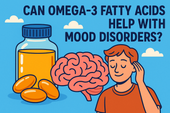
Can Omega-3 Fatty Acids Help with Mood Disorders?
Omega-3 fatty acids do more than support heart health — they can help balance mood, reduce depression, and calm anxiety. Discover how EPA and DHA nourish your brain, fight inflammation, and support emotional well-being from within. 🌊🧠
-

Vitamin D and Mood: The Sunshine Vitamin for Emotional Balance
Could the key to emotional balance be as simple as a little sunlight? Discover how vitamin D — the sunshine vitamin — influences serotonin, reduces inflammation, and helps you feel more positive and resilient year-round. ☀️💛
-

The Role of Magnesium in Reducing Irritability and Low Mood
Feeling on edge or emotionally drained? Magnesium could be the missing link between your body and your mood. Discover how this essential mineral reduces irritability, balances neurotransmitters, and helps your nervous system find calm again. 🌿✨
-
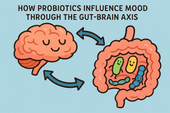
How Probiotics Influence Mood Through the Gut-Brain Axis
Discover how probiotics can do more than support your digestion—they can actually uplift your mood. This article explores the fascinating gut-brain axis and how balancing your gut bacteria through probiotics may help reduce anxiety, improve emotional stability, and support long-term mental well-being. 🌿🧠
-
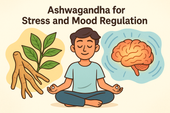
Ashwagandha for Stress and Mood Regulation
Discover how Ashwagandha, the powerful adaptogenic herb 🌿, helps your body manage stress and regulate mood. Learn how it balances cortisol, boosts GABA and serotonin, and supports emotional stability — helping you feel calm, focused, and resilient every day.
-
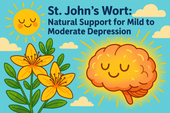
St. John’s Wort: Natural Support for Mild to Moderate Depression
Discover how St. John’s Wort, the “sunshine herb” 🌼, naturally supports mild to moderate depression. Learn how it boosts serotonin, balances mood, and promotes emotional resilience — with research showing its effectiveness compares to antidepressants, but with fewer side effects.
-
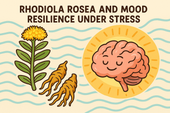
Rhodiola Rosea and Mood Resilience Under Stress
Discover how Rhodiola rosea helps your body adapt to stress 🌿. Learn how this powerful adaptogen balances cortisol, supports serotonin and dopamine, and strengthens emotional resilience — helping you stay calm, focused, and energized under pressure.
-

Chamomile and Lavender: Herbal Calm for Emotional Fluctuations
Discover how chamomile and lavender bring calm to emotional ups and downs 🌿. Learn how these two soothing herbs balance your nervous system, ease anxiety, and support restful sleep — naturally helping you find peace and emotional stability.
-
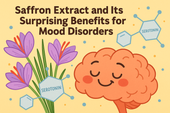
Saffron Extract and Its Surprising Benefits for Mood Disorders
Discover how saffron extract — the golden spice of joy 🌸 — can naturally support mood balance, ease anxiety, and lift mild depression. Learn what science says about its serotonin-boosting power, the ideal dosage, and how this ancient remedy compares to modern antidepressants.
-
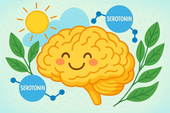
5-HTP and Serotonin: A Natural Path to Lifting Mood
Discover how 5-HTP naturally boosts serotonin 🌞 — the neurotransmitter behind mood, sleep, and emotional balance. Learn how this plant-derived compound supports happiness, reduces anxiety, and improves rest by helping your brain create more serotonin the gentle, natural way.
-
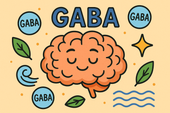
GABA Supplements for Reducing Anxiety and Mood Swings
Discover how GABA supplements can help reduce anxiety and balance mood naturally 🌿. Learn how this calming neurotransmitter works to quiet the mind, ease stress, and improve sleep — plus which nutrients and habits can boost your body’s own GABA production for long-term emotional stability.
-
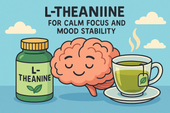
L-Theanine for Calm Focus and Mood Stability
Discover how L-theanine, the calming compound found in green tea 🍵, promotes focus, relaxation, and mood stability. Learn the science behind how it balances neurotransmitters, reduces stress hormones, and enhances clarity — helping you stay centered, calm, and productive without sedation.
-
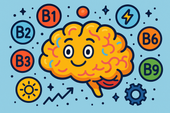
B Vitamins and Brain Chemistry: Supporting Energy and Emotional Balance
Discover how B vitamins power your brain chemistry ⚡. Learn how B6, B9, and B12 support serotonin, dopamine, and energy production — helping boost focus, mood, and emotional balance. From diet to supplements, explore how this vital nutrient group keeps your mind resilient and your energy steady.
-

N-Acetyl Cysteine (NAC) and Mood Disorders: What the Research Says
Learn how N-Acetyl Cysteine (NAC) supports brain health and mood balance 🧠. Discover how this antioxidant helps reduce oxidative stress, regulate glutamate, and improve emotional stability in depression, bipolar disorder, and anxiety — backed by cutting-edge psychiatric research.
-

Supplements for Bipolar Disorder: What May Support Stability
Discover the best supplements for bipolar disorder 🌿 that may support emotional stability and brain health. Learn how nutrients like omega-3s, magnesium, vitamin D, and NAC can help reduce inflammation, balance neurotransmitters, and complement traditional treatment safely.

















































